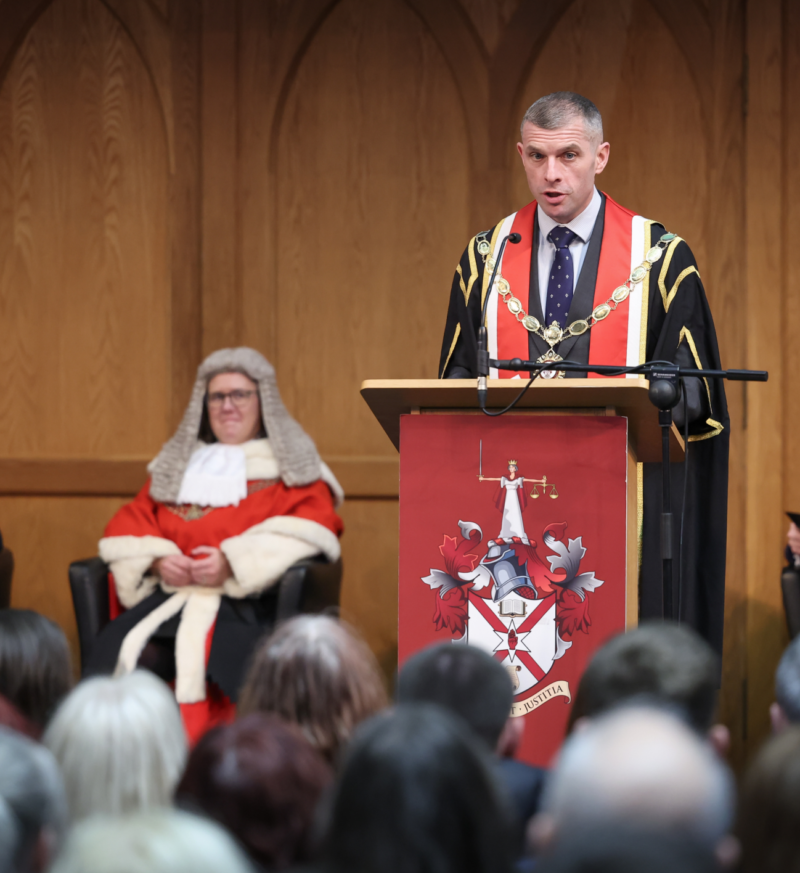

The Role of The Law Society
The Law Society of Northern Ireland is the professional body for solicitors in Northern Ireland.
Under the Solicitors (Northern Ireland) Order 1976, the Law Society acts as the regulatory authority governing the: education, accounts, discipline and professional conduct of solicitors in order to maintain the independence, ethical standards, professional competence and quality of services offered to the public.
It carries out these functions to ensure that solicitors receive the highest level of support and that their clients receive the required standard of work.
Since its establishment in 1922 under Royal Charter, the Law Society of Northern Ireland has proven to be an exemplar of legal professionalism and service delivery.
Undoubtedly its positive and contributory role has helped shape the legal system within Northern Ireland. Fundamental to the success of the Law Society over the decades has been its ability to represent its membership on key issues, to advocate on their behalf and to regulate the profession when required.
Regulatory Framework
Regulation of solicitors in Northern Ireland is a statutory and delegated function conferred on Law Society of Northern Ireland (principally) by the Solicitors' (NI) Order 1976, as amended by the Solicitors' (NI) (Amendment) Order 1989.
By virtue of this primary legislation, and secondary regulations made there under, the Law Society of Northern Ireland through its governing Council is responsible for regulating professional standards, the propriety of solicitor's professional conduct in general and the handling of client's funds in particular, professional indemnity insurance and client compensation requirements, as well as the handling of complaints about solicitors made by their clients.
The regulatory, disciplinary and compliance context within which the Law Society of Northern Ireland operates is not self-determined.
The main principles and parameters are in fact laid down by Parliament, and further reinforces that in Northern Ireland the public interest has informed and continues to be reflected in the governing primary legislation.
Lady Chief Justice of Northern Ireland (LCJ)
In the exercise of its functions the Law Society of Northern Ireland is subject in various ways to the oversight and supervision of the Lady Chief Justice of Northern Ireland (LCJ).
The LCJ acts in an appellate capacity for certain purposes, in the admission of solicitors to practice, and generally her concurrence is required before any Regulations approved by the Council can be implemented.
This structure of accountability reflects the position of solicitors as officers of the court and members of an independent profession within the justice system.
Solicitors Disciplinary Tribunal
The Solicitors Disciplinary Tribunal (SDT) is an independent body which determines complaints that arise within the legal profession. The functions of the Tribunal and its procedures are set out in Articles 43 to 54 of the Solicitors (NI) Order 1976. The SDT is governed by the Solicitors (Disciplinary Proceedings) Rules (Northern Ireland) 1990.
The Tribunal consists of a panel made up of senior solicitors and lay members, all appointed by the Lady Chief Justice.
Upon commencement of the Legal Complaints and Regulation Act 2016 in September 2025, the SDT will require at least two lay members and one legal Chair to constitute the Panel and will require a majority of lay membership overall.
Please note that the Tribunal’s website is currently under construction and will be made available as soon as possible.
Professional Indemnity Insurance
As an additional client protection measure, all solicitors in private practice are required to maintain Professional Indemnity Insurance at a level and to a specification prescribed by the Law Society of Northern Ireland.
This cover is a pre-condition to the ability to practice. The Law Society of Northern Ireland has successfully operated for many years a mutual form of Professional Indemnity Insurance (through a corporate Master Policy) which provides a guarantee of recovery to clients where loss has been suffered through the actions of solicitors.
This reflects positively the willingness of the profession in Northern Ireland to assume a collegiate approach to, and responsibility for, client protection.
Compensation Fund
The Law Society of Northern Ireland’s Compensation Fund is a financial safety net established under statutory authority to provide compensation to individuals or entities who suffer financial loss due to the dishonesty of a solicitor or a firm of solicitors in the course of legal business.
The purpose of the Fund it to protect the public and maintain confidence in the solicitor’s profession by ensuring that any victims of dishonesty or failure to account on the part of a solicitor or firm of solicitors are not left without financial remedy.
The Fund does not cover losses that have arisen due to negligence. Losses of this nature should be pursued through civil remedies and are further addressed by the coverage of Professional Indemnity Insurance. For more information on the Compensation Fund and to apply click here: Information on the Compensation Fund (Northern Ireland) Regulations 2025
Pro-active monitoring of solicitors' practices
In part because of the collegiate burden borne by the profession the Law Society of Northern Ireland has always attached a high priority to pro-active monitoring of solicitors' practices.
Thus, for example, solicitors' accounts are actively monitored by professional staff employed by the Law Society of Northern Ireland on a regular and precautionary basis, as well as in response to specific concerns identified by the Law Society of Northern Ireland in respect of particular practices.
This means action by the Law Society of Northern Ireland is not dependent exclusively on a system of self-certified or audited accounts, but by detailed bookkeeping inspections and rigorous enforcement of the relevant regulations.
Complaints Handling
In respect of complaints-handling the performance of the Law Society of Northern Ireland is subject to review and comment by the independent Lay Observer (very broadly similar to the Legal Services Ombudsman).
Apart from the casework function of reviewing the handling of particular cases by the Law Society of Northern Ireland, the Lay Observer makes recommendations periodically for improvement to procedures and other matters.
In terms of the effectiveness of the current regulation model, a series of Lay Observers have commended consistently the efficiency with which complaints are handled by the Law Society of Northern Ireland, and the degree of respect and seriousness with which the regulatory functions exercised by the Law Society of Northern Ireland are taken by the profession.
Regulatory Functions
In both the framing of regulations within its delegated authority and the discharge of all these regulatory functions, the overriding principle applied by the Law Society of Northern Ireland is to regulate in the public interest.
The Law Society of Northern Ireland regulation carries with it a formidable and extensive range of client protections and practice requirements for which solicitors have taken corporate as well as individual responsibility, despite the fact that solicitors compete in an increasingly demanding professional environment.
Without prejudice to these important protective mechanisms, and within the context of the effective enforcement of rigorous regulatory and ethical standards, The Law Society of Northern Ireland seeks to promote positively both best commercial practice and management standards.